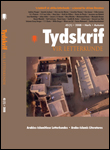Towards a conceptualization of the study of Africa’s indigenous manuscript heritage and tradition
DOI:
https://doi.org/10.17159/2309-9070/tvl.v.45i1.4485Keywords:
Timbuktu manuscripts, conservation, Islamic civilization, Mali, African manuscript traditionAbstract
This paper share experiences of th South African Conservation Technical Team of the Timbuktu Rare Manuscripts Project in the conservation and preservation of manuscripts in Timbuktu. A manuscript is always more than just its textual information – it is a living historical entity and its study a complex web of interrelated factors: the origins, production (that is, materials, formats, script, typography, and illustration), content, use and role of books in culture, educated and society in general. The widespread availability of paper made it easier to produce these manuscripts as some of the important vehicles for transmitting of knowledge in Islamic society. Islamic written culture, particularly during the time of the European middle ages was by all accounts incomparably more brilliant than anything known in contemporary Europe. The time for studying the African manuscript tradition has never been more appropriate given the recent renewed calls for the need to reappraise African history and achievements. It must be acknowledged, however, that the study of African manuscript heritage will not be without difficulty.
Downloads
References
...
Downloads
Published
Issue
Section
License
Copyright (c) 2008 Tydskrif vir Letterkunde

This work is licensed under a Creative Commons Attribution-ShareAlike 4.0 International License.


 https://orcid.org/0000-0001-6465-6584
https://orcid.org/0000-0001-6465-6584


.png)